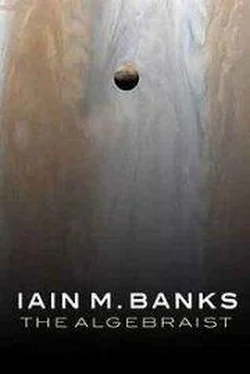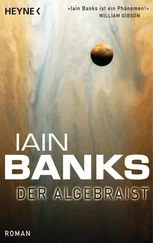“No, you mind out for branches…”
It had thought it would be safe out here, just one more ambiently black speck deep-chilled in the vast veil of icy debris wrapping the outer reaches of the system like a frozen, tenuous shroud of tissue. But it had been wrong and it was not safe.
It lay, slow-tumbling, and watched helplessly as the probing beams flickered across the pitted, barren motes far away, and knew its fate was settled. The interrogating tendrils of coherence were almost too quick to sense, too seemingly tentative to register, barely touching, scarcely illuminating, but they did their job by finding nothing where there was nothing to find. Just carbon, trace, and ice-water hard as iron: ancient, dead, and left undisturbed — no threat to anyone.
The lasers flicked off, and each time it felt hope rise, finding itself thinking, despite all rationality, that its pursuers would give up, admit defeat, just go away and leave it be, to orbit there for ever. Or perhaps it would kick away into a lonely eternity of less than light-slow exile, or drift into a closedown sleep, or… Or it might, it supposed — and this was what they feared, of course, this was why they hunted — plot and plan and gather and make and quicken and build and multiply and muster and — attack!… Claiming the vengeance that was so surely its, exacting the price its enemies all deserved to pay — by any algebra of justice under any sun you cared to name — for their intolerance, their savagery, their generacide.
Then the needle rays reappeared, fitfully irradiating the soot-ice-clinker of another set of barnacle-black detritus, a little further away, or a little closer, but always with a rapid, meticulous order to them, a militaristic precision and a plodding, bureaucratic systematicism.
From the earlier light trails, there were at least three ships. How many did they have? How many might they devote to the search? It didn’t really matter. They might take a moment, a month or a millennium to find their quarry, but they obviously knew where to look and they would not stop until they had either found what they were looking for or satisfied themselves that there was nothing there.
That it was so obviously in harm’s way, and that its hiding place, however enormous, was almost the first place they had chosen to search, filled it with terror, not just because it did not want to die, or be picked apart as they had been known to pick its kind apart before killing their victims utterly, but because if it was not safe in this place where it had assumed it would be, then, given that so many of its kind had made the same assumption, none of them would be safe either.
Dear Reason, maybe none of us are safe anywhere.
All its studies, all its thoughts, all the great things that might have been, all the fruits of change from the one great revelation it might have had, and now would never know the truth of, would never be able to tell. All, all for nothing now. It could choose to go with some elegance, or not, but it could not choose not to go.
No un-choosing death.
The needle rays from the needle ships flicked on\flicked off away across the frozen distances, and finally it could see the pattern in them, discerning one ship’s comb of scintillations from the others and so picking out the shape of the search grids, allowing it to watch, helpless, as the slow spread of that mortal inquiry crept slowly, slowly closer.
The Archimandrite Luseferous, warrior priest of the Starveling Cult of Leseum9 IV and effective ruler of one hundred and seventeen stellar systems, forty-plus inhabited planets, numerous significant artificial immobile habitats and many hundreds of thousands of civilian capital ships, who was Executive High Admiral of the Shroud Wing Squadron of the Four-Hundred-and-Sixty-Eighth Ambient Fleet (Det.) and who had once been Triumvirate Rotational human\non-human Representative for Cluster Epiphany Five at the Supreme Galactic Assembly, in the days before the latest ongoing Chaos and the last, fading rumbles of the Disconnect Cascade, had some years ago caused the head of his once-greatest enemy, the rebel chief Stinausin, to be struck from his shoulders, attached without delay to a long-term life-support mechanism and then hung upside down from the ceiling of his hugely impressive study in the outer wall of Sheer Citadel — with its view over Junch City and Faraby Bay towards the hazy vertical slot that was Force Gap — so that the Archimandrite could, when the mood took him, which was fairly frequently, use his old adversary’s head as a punchball.
Luseferous had long, sheen-black straight hair and a naturally pale complexion which had been skilfully augmented to make his skin nearly pure white. His eyes were artificially large, but just close enough to congenitally possible for people to be unsure whether they had been augmented or not. The whites beyond the black irises were a deep, livid red, and every one of his teeth had been carefully replaced with a pure, clear diamond, giving his mouth an appearance which varied from bizarre, mediaeval toothlessness to startling, glistening brilliance, entirely depending on angle and light.
In a street performer or an actor, such physiological departures might have been amusing, even a little desperate-looking; in somebody wielding the kind of power which Luseferous possessed, they could be genuinely disturbing, even terrifying. The same half-tasteless, half-horrifying effect might be claimed for his name, which was not the one he had been born with. Luseferous was a chosen name, selected for its phonetic proximity to that of some long-scorned Earth deity which most humans — well, most rHumans, at least — would vaguely have heard of in their history studies while probably not being entirely able to place when they had heard the word.
Again thanks to genetic manipulation, the Archimandrite was now and had been for some long time a tall, well-built man with considerable upper-body strength, and when he punched in anger — and he rarely punched in any other state — it was to considerable effect. The rebel leader whose head now hung upside down from Luseferous’s ceiling had caused the Archimandrite enormous military and political difficulties before being defeated, difficulties which had sometimes verged on being humiliations, and Luseferous still felt deep, deep resentment towards the traitor, resentment which easily and reliably turned itself to anger when he looked upon the man’s face, no matter how battered, bruised and bloody it might be (the head’s augmented healing functions were quick, but not instantaneous), and so the Archimandrite probably still whacked and smashed away at Stinausin’s head with as much enthusiasm now as he had when he’d first had him hung there, years earlier.
Stinausin, who had barely endured a month of such treatment before going completely mad, and whose mouth had been sewn up to stop him spitting at the Archimandrite, could not even kill himself; sensors, tubes, micropumps and biocircuitry prevented such an easy way out. Even without such extraneous limitations he could not have shouted abuse at Luseferous or attempted to swallow his tongue because that organ had been torn out when his head had been removed.
Though by now quite perfectly insane, sometimes, after an especially intense training session with the Archimandrite, when the blood trickled down from the one-time rebel chief’s split lips, re-broken nose and puffed-up eyes and ears, Stinausin would cry. This Luseferous found particularly gratifying, and sometimes he would stand, breathing hard and wiping himself down with a towel while he watched the tears dilute the blood dripping from the inverted, disembodied head, to land in a broad ceramic shower tray set into the floor.
Читать дальше












